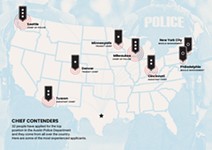What State Police Patrolling Austin Means
Send in the troopers
By Austin Sanders, Fri., March 31, 2023
Before Kirk Watson was elected mayor of Austin (for the third time), the prospect of Gov. Greg Abbott assigning more Texas Department of Public Safety troopers to patrol Austin was a threat – not the beginning of a welcomed partnership. On Oct. 2, 2019, a few months after City Council voted to decriminalize homelessness, Abbott sent a letter to then-mayor Steve Adler issuing such a threat. DPS "has authority to act statewide—including throughout Austin—to ensure the safety of state employees and [Texans] … on state-owned or state-leased property," the governor wrote. "If necessary, DPS will add troopers in Austin areas that pose greater threats." Adler responded with characteristic diplomacy, declining to engage Abbott's combative rhetoric and saying at a press conference, "I choose to read this letter as an offer of assistance … [Homelessness] is not a city challenge, it is a statewide challenge." That "offer of assistance" was rejected.
In a Dec. 21, 2020, tweet – about three months after Council approved a budget cutting $20 million from APD's budget – Abbott bragged that legislation was drafted that would allow DPS to seize control of the Austin Police Department. Adler responded: "I don't get the naked, political rhetoric. … We need leaders willing to have serious conversations about public safety." The legislation, like similar bills in past sessions, went nowhere.
But things are different around City Hall these days. The new mayor is one who spent 13 years grinding it out in the Texas Senate, with the last five of those under Abbott and Lt. Gov. Dan Patrick, with Patrick exerting new levels of power over the upper chamber with each legislative session he dominated. It's understandable (if not agreeable to the left wing of the party) for a centrist Democrat like Watson to work with Patrick and Abbott to advance legislation; without their consent, a Democrat in the Texas Senate isn't getting much done.
But for Watson, as mayor of Austin, to cut a backroom deal with Patrick and Abbott – in a town that loves a public process – is surprising. At some point Friday, March 24, Watson was in conversation with Patrick. They discussed the topic of a partnership between DPS and APD; Abbott, APD Chief Joseph Chacon, and interim City Manager Jesús Garza were looped in and by Monday, March 27, Watson had a deal he could announce publicly. Garza even had the courtesy to tell Council members about it a whopping 15 minutes before the mayor announced it in front of TV cameras.
Watson has presented the agreement as a stopgap measure to make up for years-long staffing shortages at APD. DPS troopers and special agents will assist with "violent crime and traffic issues," according to an APD news release, though they will "provide backup for other emergency situations." The announcement comes days before the meet and confer agreement between the city and the Austin Police Association expires on March 31. The Austin Police Retirement Association expects more than 70 APD retirements before the end of the month.
When asked why he acted so urgently to cement the DPS partnership, rather than initiating a public process to build support for it or including Council in the planning, Watson issued a statement that presumed to speak on behalf of Council. "Public safety has been a top priority for all members of this city council," the mayor wrote. "That is evidenced by the council members working to show respect and support for our police with an officer pay increase and retirement enhancement," which Council approved unanimously on Feb. 23.
Deploying DPS troopers while APD carries "a high number of patrol vacancies" is just a "common sense, practical solution," the mayor said. The police contract's expiration date increased the need to act urgently and Chacon was on board, so Watson – who promised to run City Hall as the new sheriff in town who gets things done – acted. "City government must be nimble and able to move to meet needs," he said. "Austin needs more police now and it had a partner that was ready to help."
DPS is not seizing control of APD, but key questions remain unanswered, such as how many troopers – who undergo different training, report to a different boss, and follow different standards of conduct – will be on duty here and which parts of the city they'll patrol. Chacon declined to answer these questions and former Dallas Police Chief U. Reneé Hall did the same in 2019 when troopers were deployed in the southern part of the city. She said sharing this kind of information with the public could jeopardize the strategic operations of the deployment.
Like Chacon, Hall agreed to more support from DPS amid a shortage of municipal officers and surging violent crime (though the latter is not really the case in Austin). Seven weeks after troopers arrived in Dallas, local elected officials and community leaders began to see them as an occupying force, demanding that they leave. DPS had made about 12,500 traffic stops and 400 arrests (and confiscated 71 firearms and 37 pounds of cannabis, which is like 16,000 joints); but according to a Dallas Morning News story, people in South Dallas – where the state police activity was concentrated – felt the tactics used by DPS were more akin to "stop and frisk" than strategic policing aimed at deterring violent crime. Just over two weeks later, troopers shot Schaston Hodge 16 times, killing him, after a traffic stop gave way to a brief chase that ended in Hodge's grandmother's driveway. A month later, the DPS operation ended, and a year after that, when Dallas officials tried to initiate a new DPS deployment, faith leaders rallied against the plan and the city declined troopers.
Despite patrol vacancies at APD, Austin remains one of the safest cities in the country. Violent and property crimes declined year over year in January and February, according to APD data. The number of homicides in Austin declined last year compared to the previous year – the first time that has happened in four years. Austin continues to rank as one of the safest U.S. cities of its size, according to some reports.
The fact that Austin remains safe could explain why at a press conference announcing the state-local partnership, Watson and Chacon repeatedly referred to the importance of Austin residents feeling safe. "As mayor of Austin my top priority is that the people of Austin both are safe and feel safe," Watson told reporters at a press conference Monday, March 27. Chacon echoed the mayor. "It is our mission … to not only have residents be safe, but to feel safe. And if you don't feel safe, even if you are, it just doesn't make for a good community."
But some have noted that for some communities, the increased presence of police can be threatening – not comforting. "The notion that increasing police is tantamount to increasing a feeling of safety ignores the experience with police that a broad swath of this majority-minority city have had," Austin Justice Coalition Policy Director Chris Harris told the Chronicle. He pointed out people in Dallas "felt oppressed" by the huge number of pretextual traffic stops by troopers. "We have a large undocumented community here and it's likely many will feel under threat," he added.
Criminal defense attorney Rick Cofer, who has worked in Austin for 14 years on both the prosecution and defense sides of criminal cases, pointed to other concerns. For one, the behavior of APD officers is governed by department rules, some of which were established following City Council direction, and local ordinances that de-emphasize enforcement of state laws criminalizing abortion and possession of marijuana.
"DPS can ignore all of that," Cofer told the Chronicle. The other factor is that APD's use-of-force policy, while imperfect and in need of improvement, is better than DPS's approach. APD trains officers on various de-escalation policies and how to approach people undergoing mental health crises. Do APD officers fail to utilize that training in critical moments that can lead to tragic outcomes? Of course. But "DPS has a totally different approach," says Cofer. "It's just a different culture over there."
Despite demonstrated overpolicing and unnecessary violence carried out by DPS during their 2019 Dallas deployment, Watson applauded the Austin-DPS partnership as a kind of bipartisan victory. It "arose out of a positive working relationship between the capital city and the Capitol of Texas … [that will benefit] our shared constituents," he said.
Echoing a frequent talking point voiced by the Austin Police Association, Watson pointed to City Council's decision in 2020 to cancel cadet classes at the Austin Police Academy as one that "amplified" the department's inability to recruit and retain officers. Perhaps, but the mayor left out crucial context. First, before Council voted to cancel classes, APD was already carrying around 200 officer vacancies. APA President Thomas Villarreal did not respond by press time to questions about the partnership.
Second, and more importantly, a key motivating factor in the decision to cancel cadet classes was the mounting evidence that the culture within the academy, and throughout APD broadly, was in need of major reform (see p.24). Specifically, the academy was found to use a "paramilitary" approach to teaching cadets that did not "align well with the principles of community policing and problem-solving," according to an internal APD report.
Reactions from Council members have been mixed. Several, including Mackenzie Kelly, Ryan Alter, and Leslie Pool, have publicly expressed support of the city-state partnership. But although Watson told us that the collaboration will be supervised by Chacon with "transparency, monitoring, and reporting" to ensure Austin values are met, not all CMs are convinced. "Like many, I still have serious concerns regarding this new plan," CM Zo Qadri tweeted. "It's up to Council to make sure our community gets the high level of clarity it expects and deserves."
Want to Weigh In on How You're Policed?
If you are interested in how Austin police officers are held accountable when accused of misconduct, our May 6 election will have a significant influence on the city’s system of oversight. Austin voters will decide between two city ordinances, both placed on the ballot through the petition initiative process. Both are called the Austin Police Oversight Act, but Prop A was supported by various progressive justice reform organizations and Prop B was supported by a group fronting for the Austin Police Association. The outcome of the election is unlikely to establish a new oversight system overnight, due to complex legal issues, but it will at least signal to City Council, city staff, and the APA how negotiations over the currently stalled police contract should proceed.
* Editor's note Thursday, March 30, 4:30pm: A previous version of this story incorrectly stated attorney Rick Cofer has worked as an attorney in Austin for 20 years; it has been 14 years. We regret the error.
Got something to say on the subject? Send a letter to the editor.










